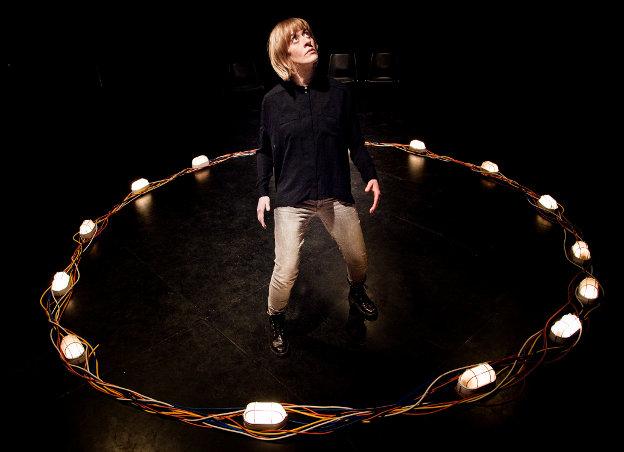A Thousand Shards of Glass starts with a warm welcome from solo performer Lucy Ellinson. She has a seemingly innocent question or remark for each of us as we are led in groups of three or four to seats set around a circular network of wires and tunnel lamps. From the start, we are in it together: we have a part to play, and Lewis Gibson’s incredibly immersive soundscape never lets us go. We occupy the space; we occupy the world.
A Thousand Shards of Glass can be experienced as a thrilling performance response to the Invisible Committee’s pamphlet The Coming Insurrection, a French political tract that hypothesises the ‘imminent collapse of capitalist culture’. Organised around the militant/performer, the audience forms an intimate first circle which soon exceeds theatre’s confines. The rhythm of the text alternates between rhapsodic chanting and the feeling of bullets breaking a shop-window. Cracks appear in our consumerist world, our thoughts slipping through them with an urge that might well bring the whole thing down. But what next? What awaits on the other side of the spectacle? Can we walk on shards of glass? ‘As long as there are enough,’ answers Laura, so inspiringly performed by Ellinson.
Moving from Cold War thrillers to graphic novels via allusions to a mediatised Arab Spring, the performance poignantly distorts the cultural products of global spectacle. Celluloid anti-heroes or comic book rebels seldom cross into politics, and we can muse on theatre’s ability to bridge the gap between aesthetics and political thought, or can choose, like the Jane Packman Company here, to follow its gateways, tunnels, elevators. A Thousand Shards of Glass might take us to bathe in metropolitan mysticism and psychogeography in Cairo and London, yet another world materially appears in this performance. Portable speakers are not the only thing that audience members are invited to manipulate; it is the very grain of the insurgent voice that is within reach. We are as many shards of glass, as many narrative fragments, as many conflagrated bodies gathered here, and it feels good and empowering to partake in this collective storytelling dérive.
Then suddenly we reach a clearing in our midst, a collective Arctic, an imaginary space where thought clarifies for whoever wants to think and act. Jane Packman Company’s insurrection of words and sounds breathes life into our activist selves. This powerful work doesn’t take theatre for a commodity.

